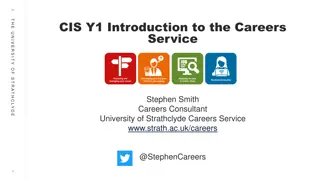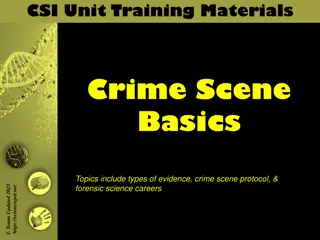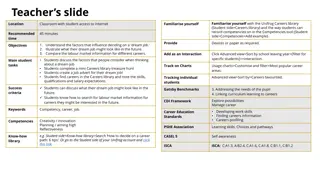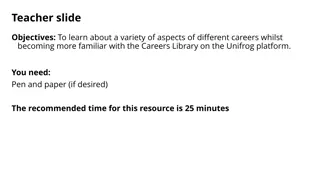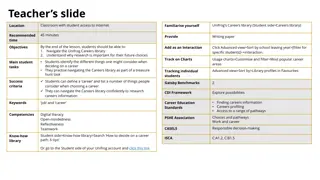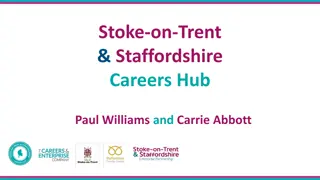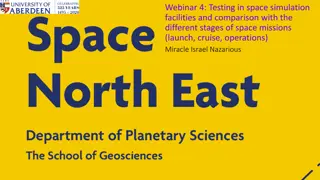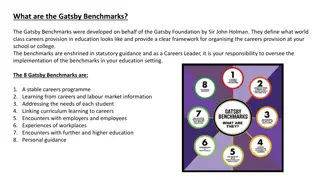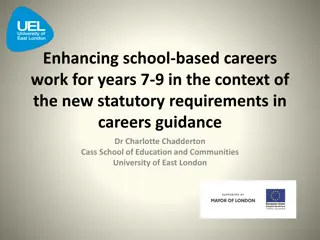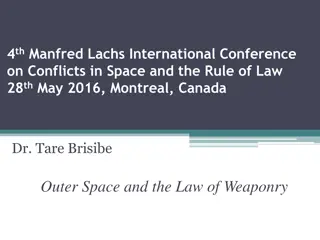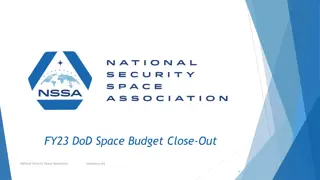Exploring Careers in the UK Space Sector
Discover the diverse job opportunities in the UK space industry and explore various disciplines of science involved. Learn about different roles such as design engineer, space business manager, space artist, and more. Find out how to enter these careers through university courses, apprenticeships, or direct applications. Engage with interactive activities and resources to spark interest in working in the fascinating field of space.
Download Presentation

Please find below an Image/Link to download the presentation.
The content on the website is provided AS IS for your information and personal use only. It may not be sold, licensed, or shared on other websites without obtaining consent from the author. Download presentation by click this link. If you encounter any issues during the download, it is possible that the publisher has removed the file from their server.
E N D
Presentation Transcript
FIND YOUR SPACE Why work in the UK space sector?
Lesson guide The presentation gives some brief facts about the UK space industry. You could take the opportunity to ask the students some questions. Such as: If they know anyone who works in the space sector. What jobs they think there are? If they would like to work in the space sector? What jobs might they want to do? Which subjects do you enjoy most gives an opportunity to link school subjects to a career in the space sector, ask students if they can think of links. This can be done before and after the videos to highlight the diversity in job skills shown. Science disciplines activity. Multiple choice questions give the students an opportunity to select the most appealing career videos to watch. Including links to online information about university, gap years and apprenticeships. The videos slides contain additional information about the routes to the jobs and links to online information. Frequently asked questions section gives some quotes from the videos which may help provide answers.
Jobs in the space sector include many disciplines of science. PHYSICS CHEMISTRY BIOLOGY Can you match the following disciplines to the most appropriate branch of science? Some may be in more than one. GEOLOGY ASTRONOMY ZOOLOGY MEDICINE ASTRO- PHYSICS PLANETARY SCIENCE COSMOLOGY METEOR- OLOGY BIO- MICRO- BIOLOGY BOTANY ECOLOGY ASTRO- BIOLOGY ASTRO- CHEMISTRY CHEMISTRY
Astrophysics Cosmology Geology Astrochemistry Meteorology Astronomy Planetary sciences CHEMISTRY PHYSICS Medicine Biochemistry Astrobiology Zoology Microbiology Botany Ecology Suggested answers. BIOLOGY
Which letters did you get the most? Ben Design Engineer E E B Amar Space business manager B A Loz Space artist A L Joanne Space solicitor L R Colin Space weather expert, researcher R F F Sarah Research fellow and lecturer (astronomer) M M David Space education program manager C C Dhara Space expert and communicator
Ben Design Engineer You can get into this job through: A university course, an apprenticeship or applying directly. University You'll normally need a foundation degree, higher national diploma or degree. You could choose from subjects like: engineering product design industrial design computer-aided design engineering engineering design and manufacture materials science maths and physics Mechanical, electrical and civil engineering qualifications may also be welcomed by employers. Entry requirements You'll usually need: 1 or 2 A levels, or equivalent, for a foundation degree or higher national diploma 2 to 3 A levels, or equivalent, for a degree Link to video - https://youtu.be/0my9Yk1DnFw E The average salary for a Design Engineer in United Kingdom is 30,100. https://nationalcareers.service.gov.uk/job-profiles/design-and- development-engineer https://www.payscale.com/research/UK/Job=Design_Engineer/Salary https://www.prospects.ac.uk/job-profiles/design-engineer
You can get into this job through: A university course, an apprenticeship, working towards this role or a graduate training scheme. University Getting a degree in any subject can help you get into this type of job, although business or project management may give you an advantage. You can take postgraduate qualifications in project management to increase your understanding, though they are not essential for getting into the role. Entry requirements You'll usually need: 2 to 3 A levels, or equivalent, for a degree Amar Space Business Manager Link to video - https://youtu.be/h75rsj8sZ6c B The average salary for a Business Manager in United Kingdom is 36,079. https://nationalcareers.service.gov.uk/job-profiles/business-project-manager https://www.payscale.com/research/UK/Job=Business_Manager/Salary https://www.prospects.ac.uk/job-profiles/business-development-manager
You can get into this job through: A university course, a college course or self- teaching University You'll need a high level of skill and talent in your chosen art form. To develop these skills, you could train by doing a degree or postgraduate award in: art and design art history fine art visual arts graphic arts Entry requirements You'll usually need: a foundation diploma in art and design 2 to 3 A levels, or equivalent, for a degree a degree in a relevant subject for postgraduate study Loz Space Artist Link to video - https://youtu.be/5Raf0pc_y3s A The average salary for a Graphic Artist in United Kingdom is 19,897. https://nationalcareers.service.gov.uk/job-profiles/fine-artist https://www.payscale.com/research/UK/Job=Graphic_Artist/Salary https://www.prospects.ac.uk/job-profiles/fine-artist
Joanne Space Lawyer You can get into this job through: A university course, an apprenticeship, working towards this role and the traditional solicitor qualifying route until 2032 University In order to qualify, you must: take an undergraduate degree or equivalent qualification, in any subject pass part 1 and 2 of the Solicitors Qualifying Exam (SQE) complete 2 years (or equivalent if part- time) qualifying work experience meet the character and suitability requirements of the Solicitors Regulation Authority (SRA) Though your degree does not have to be in Law, you will need some legal knowledge to pass the SQE. To study Law at some universities you'll need to pass the Law National Aptitude Test (LNAT). Link to video - https://youtu.be/QjHyLCmq53E L Lawyer is a general term referring to anyone who is qualified to give legal advice as a licensed legal practitioner. This includes solicitors and barristers. The average salary for a Lawyer in United Kingdom is 50,736. https://nationalcareers.service.gov.uk/job-profiles/solicitor https://www.payscale.com/research/UK/Job=Attorney_ https://www.prospects.ac.uk/job-profiles/solicitor
Colin Space Weather Expert You can get into this job through a university course. University You usually need a first or 2:1 (upper second class) degree in a science subject to become a research scientist. Most research scientists continue to study for a postgraduate qualification like a PhD. You could study an integrated postgraduate master's course. These courses include independent research and are designed to lead directly to a PhD. Entry requirements You'll usually need: 2 to 3 A levels, or equivalent, for a degree a degree in a relevant subject for postgraduate study Link to video - https://youtu.be/FOrhX4RFPhs R The average salary for a Scientific Researcher in United Kingdom is 32,151. https://nationalcareers.service.gov.uk/job-profiles/research-scientist https://www.payscale.com/research/UK/Job=Researcher%2C_Scientific/Salary https://www.prospects.ac.uk/job-profiles/research-scientist-physical-sciences
Sarah Research Fellow and Lecturer (astronomer) Link to video - https://youtu.be/q9MqPVQHQXU You can get into this job through a university course. University You'll need a degree and postgraduate qualification to work as an astronomer. You'll usually need to have achieved a first or a 2:1 in your degree. Relevant subjects include: Maths, physics, astrophysics, geophysics, astronomy, space science. You can also do a 4-year degree to get a postgraduate qualification like a master of physics. These courses include more independent research and can lead directly onto a PhD. Entry requirements You'll usually need: 5 GCSEs at grades 9 to 4 (A* to C), or equivalent, including English, maths and science 2 or 3 A levels, or equivalent, including maths and physics a degree in a relevant subject for postgraduate study F The average salary for a Research Fellow in United Kingdom is 34,373. https://nationalcareers.service.gov.uk/job-profiles/astronomer https://www.payscale.com/research/UK/Job=Research_Fellow/Salary https://www.prospects.ac.uk/job-profiles/astronomer
You can get into this job through: A university course, working towards this role or a graduate training scheme. University Getting a degree in any subject can help you get into this type of job, although business or project management may give you an advantage. You can take postgraduate qualifications in project management to increase your understanding, though they are not essential for getting into the role. Entry requirements You'll usually need: 2 to 3 A levels, or equivalent, for a degree David Space Education Manager Link to video - https://youtu.be/m8ip44PjkwI M The average salary for a Program Manager (General) in the United Kingdom is 50,990. https://www.payscale.com/research/UK/Job=Program_Manage https://www.prospects.ac.uk/job-profiles/project-manager
You can get into this job through: A university course or working towards this role. University Getting a degree in any subject can help you get into this type of job, although a course relevant to the subject you want to be an expert in may give you an advantage. You can take postgraduate qualifications in the subject to increase your understanding, though they are not essential for getting into the role. Entry requirements You'll usually need: 2 to 3 A levels, or equivalent, for a degree Dhara Space Expert Link to video - https://youtu.be/OIL8ut6XqnU C The average salary for a Subject matter expert in United Kingdom is 35,000. https://www.payscale.com/research/UK/Skill=Subject_Matter_Expert/Salary https://www.prospects.ac.uk/job-profiles/science-writer
Would you like more information? https://spacecareers.uk/home HTTPS://SPACECAREERS.UK/HOME https://www.gov.uk/government/publications/space-related-educational-resources/uksa-careers-leaflet HTTPS://WWW.GOV.UK/GOVERNMENT/PUBLI CATIONS/SPACE-RELATED-EDUCATIONAL- RESOURCES/UKSA-CAREERS-LEAFLET https://www.ukspace.org/careers/ HTTPS://WWW.UKSPACE.ORG/CAREERS/ https://www.gov.uk/government/publications/space-related-educational-resources/uksa-careers-leaflet https://www.gov.uk/government/publications/space-related-educational-resources/uksa-careers-leaflet
Frequently asked questions Why should I work in the space sector? The space sector is growing very quickly, there's a massive shortage of people studying these technical subjects, there's a lot of jobs out there and the jobs are well paid. I think it's a fun job, it's always different you know, no two days are the same. Ben What sort of impact can I make with a job in the space sector? Space is an entire field of endeavour. If you want a career that also will make a difference to Humanity's future in terms of the environment, in terms of connectivity, in terms of lifting people out of poverty, space will unlock a lot of answers to our problems. and you will be doing good things and you will be paid well and there will always be a job for you. David Is being female a barrier to working in the space sector? When I got to college and I decided to study Physics, I was one of three girls in our class and I noticed that there was an imbalance, but actually, I wasn't limited for many of the opportunities at that point As a female I would say that I definitely feel like as we're progressing into the future, actually it's an advantage to have or to be different. What we're looking for now is a more diverse range of people with a diverse range of skills and perhaps you, as someone who doesn't make up the majority of the group, can bring something that other people might not be able to. Dhara Quick fire questions - https://www.youtube.com/playlist?list=PLrrRtiBgUv4nCvjAgpNF8OGwgnaL8Nrod
Frequently asked questions Do I have to decide what I want to do now to succeed? It is a fantastic industry to be involved in. But where you end up might not be where you thought you were going to end up, so be open to the other opportunities, be open to everything that is out there and find something that that really excites you because when you do it becomes that much easier. Colin Do I have to take triple science to get a space related job? I went to a comprehensive school, we did dual award science because that was what the school did, I didn't do further maths because it wasn't offered and they were not barriers, they might have made things easier, but the fact that I didn't do them wasn't a problem, the fact that I didn't go to a selective School wasn't a problem . it helped that the university recruits from a wide base of students. Sarah What advice would I give to your 16 year old self? Listen to your intuition and don't be scared to follow what the path that you want to go on. Just because it might not be what everyone else is doing doesn't mean it's wrong, just go for it don't second guess yourself. Sometimes even at school in your best subjects or your worst subjects you might be doing bad in the grades, but it doesn't mean that you should give up on them if you're interested in the subject, it's just you haven't found your way of learning it yet.Loz Quick fire questions - https://www.youtube.com/playlist?list=PLrrRtiBgUv4nCvjAgpNF8OGwgnaL8Nrod
Loz Space Artist Ben - Engineer Astronomer Sarah - Weather Expert Colin Space Expert Dhara Space Developer Business Amar Space Lawyer Joanne Space Educator David Space Personal Male Female Ethnically white Ethnically non-white UK state school educated UK private school educated International education Travelling or disrupted education Technical/apprenticeship education University educated Parental push-back/disapproval of choices First in their family to go to university STEM subjects Humanities Arts Communications Problem solving Career uncertainty earlier in life Coping with failure or changing interests Imposter syndrome/crisis of confidence Addresses being female in the industry Has switched careers Variety in the job Business and enterprise Travel opportunities Has worked for European Space Agency Speaks on diversity and inclusivity The importance of extra-curricular activity Sports Climate change Family life Educational background Subjects and skills Career journey Experience of work Life outside work
The eight Gatsby benchmarks of Good Career Guidance are: 1. A stable careers programme - Permanent fixture of developing resources on the site. 2. Learning from career and labour market information Labour market info. The number of people employed in the relevant industry in the UK / Europe. Industry growth. Future study options. https://www.lmiforall.org.uk/ 3. Addressing the needs of each pupil Should be clear what age it is aimed at and relevant to them. Should embed equality and diversity throughout. Give examples of jobs at all levels of education. Show people of different backgrounds. 4. Linking curriculum learning to careers - What subjects does it relate to at school, A-levels / Degree required. 5. Encounters with employers and employees - Every pupil should have opportunities to learn from employers about work, employment and the skills that are valued in the workplace. 6. Experiences of workplaces 7. Encounters with further and higher education - All pupils should understand the full range of learning opportunities that are available to them. This includes both academic and vocational. 8. Personal guidance Required from qualified practitioners.
Know your sciences PHYSICS CHEMISTRY BIOLOGY Can you put the following disciplines into the correct category? Some may be in more than one. GEOLOGY ASTRONOMY ZOOLOGY MEDICINE ASTRO- PHYSICS EARTH SCIENCE OCEAN- OGRAPHY METEOR- OLOGY BIO- MICRO- BIOLOGY ECOLOGY ASTRO- BIOLOGIST ARCHAE- OLOGY BOTANY CHEMISTRY
PHYSICS CHEMISTRY Can you put the science disciplines into the correct category? Some may be in more than one. BIOLOGY


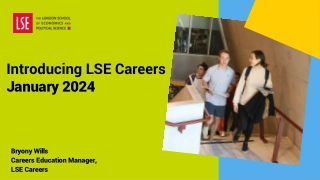
![Read⚡ebook✔[PDF] Linking the Space Shuttle and Space Stations: Early Docking Te](/thumb/21519/read-ebook-pdf-linking-the-space-shuttle-and-space-stations-early-docking-te.jpg)
![READ⚡[PDF]✔ Emerging Space Powers: The New Space Programs of Asia, the Middle Ea](/thumb/21554/read-pdf-emerging-space-powers-the-new-space-programs-of-asia-the-middle-ea.jpg)
